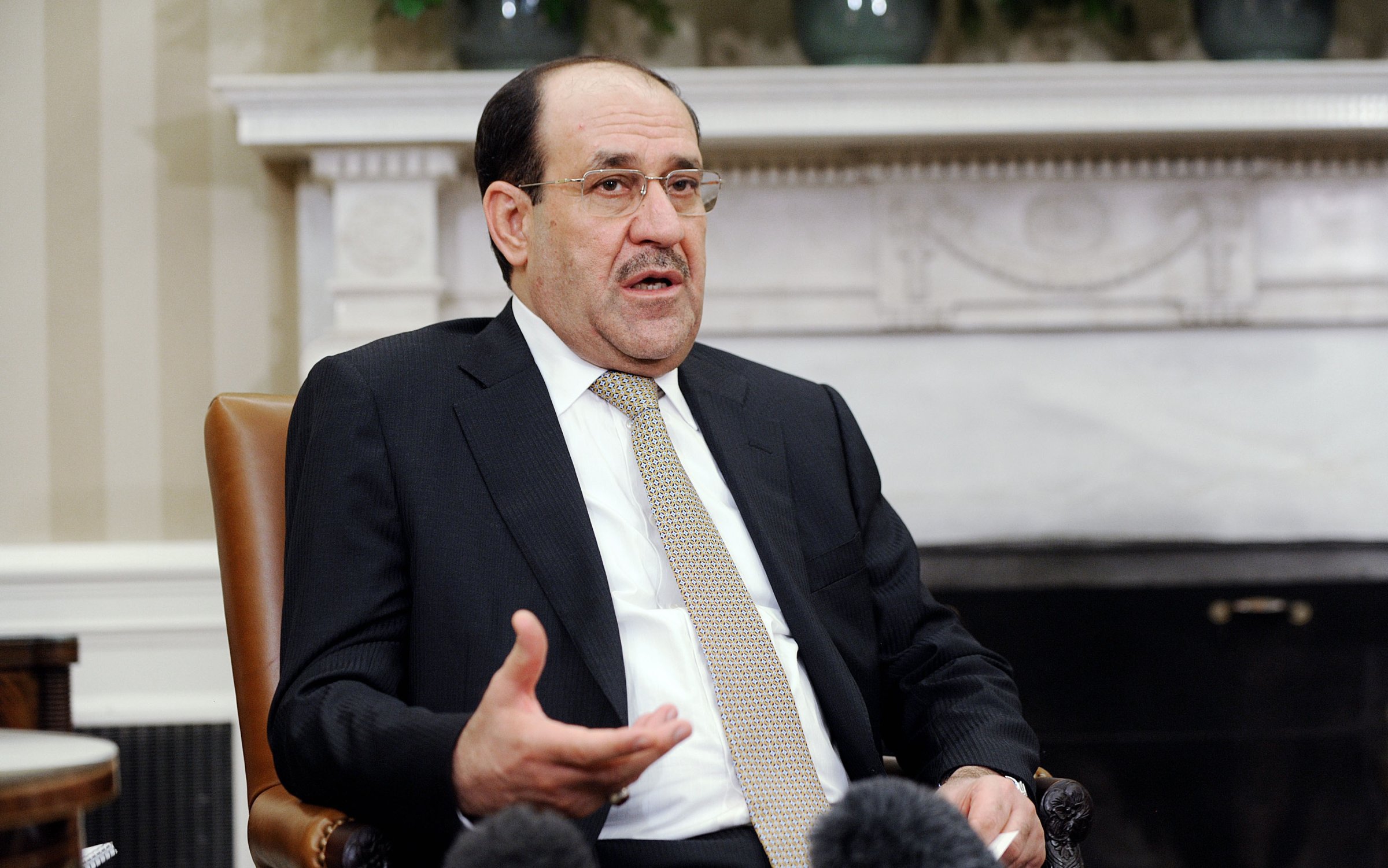
For several months, the Obama Administration has made it clear that it wanted Iraqi Prime Minister Nouri al-Maliki to step aside and make way for a more inclusive government, seen as a critical step to bringing Iraq back from the brink of disintegration along sectarian lines.
Now, in what is likely the biggest challenge yet to Iraq’s stability and integrity, the forces of the Islamic State of Iraq and Greater Syria (ISIS) are capturing new territory in northern and central Iraq, sending thousands of Yazidis and Christians fleeing for their lives, and killing virtually any Shi’ite who stands in their path. Amidst this, Maliki is adding fuel to the fire and pulling the world’s attention back in the direction of Baghdad.
On Monday, Maliki defied calls to make way for Haidar al-Abadi as the country’s new prime minister, insisting that after two terms in the job, he is entitled to a third according to the Iraqi constitution. On Sunday, Maliki accused the country’s new president, Fouad Massoum, a Kurd elected by parliament, of carrying out “a coup against the constitution and the political process.” Maliki’s son-in-law Hussein al-Maliki told Reuters that the president’s decision to name Abadi as the new premier was “illegal”.
Upping the ante, Maliki has deployed his special forces and Shi’ite militias around Baghdad, suggesting he might use force to thwart any attempt to enforce the decision. The increased presence of forces in the capital takes place against the backdrop a recent string of car bombings aimed at Shi’ite neighborhoods, and indications that ISIS is looking for an opportunity to advance toward Baghdad.
Douglas Ollivant, a former Director for Iraq on the National Security Council under the Bush and Obama Administrations, suggests Maliki’s actions may be bluster. “We don’t know where Iran stands on this, but unless they back him on his bid to stay, I think he’s posturing—that’s what people do,” he says. “I think he knows that will really cross a red line for ‘peaceful retirement,’ which we presume is what he wants.”
Ollivant, now a Senior National Security Studies Fellow at the New America Foundation in Washington, spoke to TIME immediately after a press conference given by President Barack Obama late on Monday afternoon. “There is no American military solution to the larger crisis in Iraq,” Obama said. “The only lasting solution is for Iraqis to come together and form an inclusive government.” Obama also noted that he had “stepped up military advice and assistance to Iraqi and Kurdish forces as they wage the fight against ISIL,” another name for ISIS.
The key goals for now are essentially to contain ISIS, helping Kurdish forces to keep Islamic militants from reaching outskirts of Erbil, the capital of Iraq’s semiautonomous Kurdish region, where the US maintains a consulate. “I think the president has made it clear that that’s all he’ll do until a new government has been formed,” Ollivant adds.
But Abadi has up to a month to do so. What happens to Iraq in the meantime?
“If they try taking Erbil or something on the border with Jordan or Baghdad, the U.S. airpower will engage them. Essentially, the airpower is holding them off from going any further,” Ollivant says. “If they can get a representative government, I think they [the Obama Administration] would like to do an attack on ISIS in the mold of what happened in Libya, combining foreign airpower with local ground forces in a more concerted effort,” he said, referring to the 2011 overthrow of Muammar Gaddafi.
Today, of course, Libya is a nation in tatters. The Obama Administration had hoped to leave Iraq in a much more stable place when it pulled out the last U.S. troops later that year, in December, 2011. A chorus of critics blame Maliki for his hyper-sectarian campaign that alienated Sunnis—and may have even pushed some of them into the arms of ISIS. Now, ISIS also has American weaponry in its hands, left behind by retreating Iraqi government forces when the militants seized Mosul in June.
“The US has basically armed ISIS, because they take these weapons over and they know how to use them. And they are drawing support deep within the Islamic consciousness and the Sunni uprising,” says David Andelman, an Iraq expert and the editor of World Policy Journal in New York. “Obama came into office on the platform of, we’re closing down wars overseas: Iraq and eventually Afghanistan. He believed he made good on that pledge, and now he’s discovering he didn’t. They left so many loose ends, and now we’re going to have to go in and clean them up.”
All of which leaves the Obama Administration—and the Iraqis and Kurds who are keen for massive military backing sooner rather than later—in a difficult place. America wants no boots on the ground, and no one in the Iraqi government wants to be seen as inviting them back. But airstrikes have their limits, and may not be enough to stop ISIS from reaching just a little farther.
More Must-Reads from TIME
- Why Trump’s Message Worked on Latino Men
- What Trump’s Win Could Mean for Housing
- The 100 Must-Read Books of 2024
- Sleep Doctors Share the 1 Tip That’s Changed Their Lives
- Column: Let’s Bring Back Romance
- What It’s Like to Have Long COVID As a Kid
- FX’s Say Nothing Is the Must-Watch Political Thriller of 2024
- Merle Bombardieri Is Helping People Make the Baby Decision
Contact us at letters@time.com